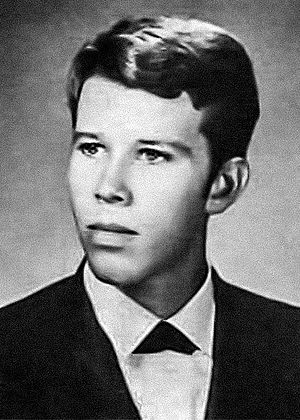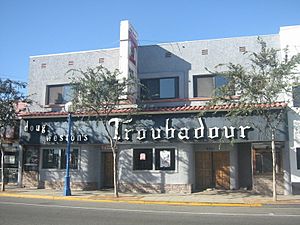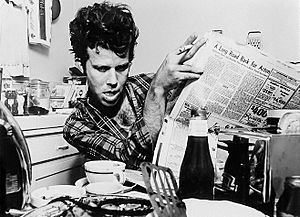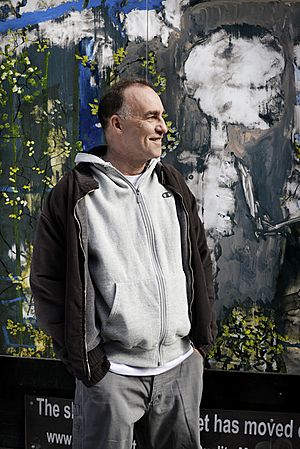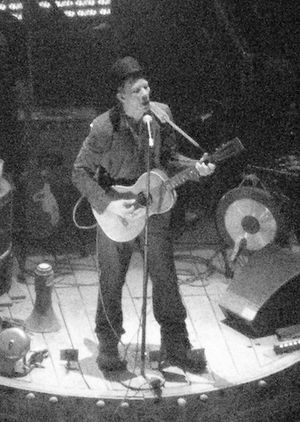Tom Waits facts for kids
Quick facts for kids
Tom Waits
|
|
|---|---|
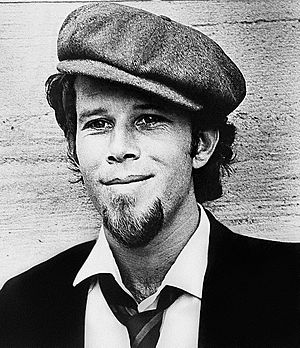
Waits in a publicity photo for Asylum Records c. 1974–75
|
|
| Born |
Thomas Alan Waits
December 7, 1949 Pomona, California, U.S.
|
| Occupation |
|
| Years active | 1969–present |
| Spouse(s) |
Kathleen Brennan
(m. 1980) |
| Children | 3 |
| Musical career | |
| Genres | |
| Instruments |
|
| Labels |
|
Thomas Alan Waits (born December 7, 1949) is an American singer, songwriter, and actor. His songs often tell stories about interesting characters and places. He sings in a unique, deep, and gravelly voice. He started his career in the folk scene during the 1970s. Since the 1980s, his music has mixed many different styles. These include rock, jazz, Delta blues, opera, and cabaret. He also uses experimental sounds.
Tom Waits grew up in a regular family in Pomona, California. He was inspired by Bob Dylan and the Beat Generation writers. He began singing in folk clubs in San Diego. In 1972, he moved to Los Angeles and started writing songs. He then signed a contract with Asylum Records. His first album, Closing Time, came out in 1973. Other early albums included The Heart of Saturday Night (1974) and Nighthawks at the Diner (1975). He toured a lot in the United States, Europe, and Japan. He became more popular with albums like Small Change (1976) and Blue Valentine (1978). Around this time, Waits also started acting in movies, like Paradise Alley (1978).
In 1980, Waits married Kathleen Brennan. With her help, his music became more experimental. This new sound can be heard on albums like Swordfishtrombones (1983), Rain Dogs (1985), and Franks Wild Years (1987). He also worked with theater director Robert Wilson on musicals. The songs from these shows were released as albums like The Black Rider (1990), Alice (2002), and Blood Money (2002). Waits won Grammys for Bone Machine (1992) and Mule Variations (1999). He continued to release music, including Real Gone (2004) and Bad as Me (2011).
Tom Waits has influenced many other artists. His songs have been performed by famous musicians like Bruce Springsteen and Rod Stewart. He has also written songs for Johnny Cash and Norah Jones. In 2011, he was added to the Rock and Roll Hall of Fame.
Contents
Tom Waits's Early Life and Music (1949–1976)
Growing Up in California
Thomas Alan Waits was born on December 7, 1949, in Pomona, California. He has an older and a younger sister. His father was a Spanish teacher, and his mother managed the home. Waits described his childhood as "very middle-class." He learned to play the bugle and guitar in elementary school. His father also taught him the ukulele.
During summers, he visited relatives in northern California. He later said that his uncle's rough voice inspired his own singing style. In 1959, his parents separated. His mother moved with the children to Chula Vista, near San Diego. Waits attended O'Farrell Community School and led a school band called the Systems. He loved R&B and soul singers like Ray Charles. Bob Dylan also became a big inspiration.
Waits was inspired by live music from a young age. He saw Lightnin' Hopkins perform when he was fifteen. He also saw James Brown in 1962. By the time he was at Hilltop High School, he was interested in being a bit rebellious. He preferred the 1950s Beat generation writers like Jack Kerouac over the hippie culture. In 1968, at age 18, he left high school.
Waits worked at a pizza restaurant and a diner. He enjoyed listening to people's conversations and writing down interesting phrases. He also worked as a fireman for the forestry service and served in the Coast Guard. He studied photography in college for a while. He kept playing music and taking piano lessons. He started going to folk music clubs in San Diego.
Starting His Music Career
In 1969, Waits worked as a doorman at the Heritage coffeehouse, which had folk music shows. He also started singing there, performing covers of songs by Bob Dylan. Soon, he began to sing his own songs, including "Ol' 55" and "I Hope That I Don't Fall in Love With You." As he became more known, he played at other places in San Diego. He also traveled to Los Angeles to play at The Troubadour club.
In 1971, music manager Herb Cohen noticed Waits at The Troubadour and signed him. Waits then moved to Silver Lake, a neighborhood in Los Angeles. He continued to perform at The Troubadour, where he met David Geffen, who signed him to Asylum Records. His first album, Closing Time, was released in March 1973. It didn't get much attention at first. The Eagles later covered his song "Ol' 55," which brought Waits more recognition.
To promote his album, Waits toured the U.S., opening for other artists. He felt discouraged about his career at times. He also toured with Frank Zappa's band, the Mothers of Invention, but audiences were sometimes difficult.
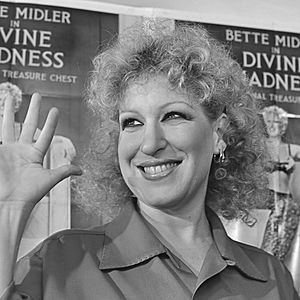
In 1974, Waits recorded his second album, The Heart of Saturday Night. This album was more focused on jazz. Waits imagined it as a collection of songs about nightlife in the U.S. The album received more reviews than his first. He continued to tour and performed as a headline act. In New York City, he met and became friends with Bette Midler.
In 1975, Waits released Nighthawks at the Diner, which was recorded live to sound like a jazz club. The album cover was inspired by the famous painting Nighthawks. He toured the U.S. and Europe. When he returned to Los Angeles, he moved into the Tropicana motel. He told the Los Angeles Times that he liked to create situations to write about, living in a "self-imposed poverty."
Growing Fame and New Sounds (1976–1988)
Breakthrough Albums and Film Roles
In July 1976, Waits recorded Small Change. He felt this album was a big step in his songwriting. It was well-received by critics and was his first album to appear on the Billboard Top 100 Album List. The album showed Waits as a "master storyteller." He started getting more attention from magazines like Newsweek and Time. He began to gain a dedicated fan base. He toured to promote the album, even having a female dancer join him on stage for one song. In 1977, he toured Japan for the first time.
In 1977, Waits recorded his fourth studio album, Foreign Affairs. It included "I Never Talk to Strangers," a duet with Bette Midler. This album was not as popular with critics as Small Change. That year, he started a relationship with singer-songwriter Rickie Lee Jones. Their music and styles influenced each other. He began using props on stage during his tours, like a street lamp.
Waits also started acting more. He became friends with actor and director Sylvester Stallone. Waits made his film debut as a piano player in Stallone's Paradise Alley (1978). He also started writing a movie musical, but it was never finished.
Changing Musical Direction
In July 1978, Waits began recording Blue Valentine. He changed musicians during the recording to create a less jazz-focused sound. He also switched from piano to electric guitar as his main instrument for the album. His songs started to tell more vivid and complex stories. His first single, "Somewhere" from West Side Story, was released but did not become a hit. For his Blue Valentine tour, Waits used a gas station as a set for his performances. He toured Europe and Australia for the first time.
Waits was not happy with his record label, Elektra-Asylum. He felt they were more interested in their bigger, more successful artists. His relationship with Rickie Lee Jones ended. In September, Waits decided to move to New York City. He felt he "just needed a new urban landscape."
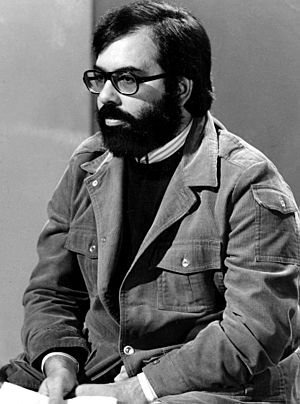
Filmmaker Francis Ford Coppola asked Waits to return to Los Angeles to write music for his film, One from the Heart. Waits was excited but also felt it was a step backward artistically. He was nominated for an Academy Award for Original Music Score in 1982 for his work on the film.
Waits still owed Elektra-Asylum one more album. He recorded Heartattack and Vine in June 1980. This album had a stronger rock and R&B sound. It also reached the Top 100 Album Chart. One of its songs, "Jersey Girl," was later recorded by Bruce Springsteen. While working on One from the Heart, Waits met Kathleen Brennan, who was an assistant story editor. They fell in love quickly and married in August 1980.
New Beginnings with Kathleen Brennan
After marrying, Waits and Brennan moved into an apartment in Los Angeles. Brennan brought stability and emotional security to Waits's life. She also helped him manage his career. Waits said that Brennan introduced him to new music, especially Captain Beefheart and Harry Partch. Partch was a composer who made his own instruments from everyday items. Waits started to use images and ideas instead of just moods for his songs.
Waits wrote the songs for Swordfishtrombones during a trip to Ireland. He produced the album himself. Swordfishtrombones moved away from his earlier jazz sound. It was his first album without a saxophone and included instruments like the marimba. His old label, Asylum, didn't want to release it. So, Waits signed with Island Records, a label known for more experimental artists. Critics praised Swordfishtrombones for its unique sound.
In 1983, Waits appeared in three more Coppola films: Rumble Fish, The Outsiders, and The Cotton Club. In September, his daughter, Kellesimone, was born. Waits wanted to keep his family life private and spend time with his daughter. He moved his family to New York City. He found New York challenging but met many new musicians and artists. He became friends with John Lurie and filmmaker Jim Jarmusch.
Rain Dogs and Franks Wild Years
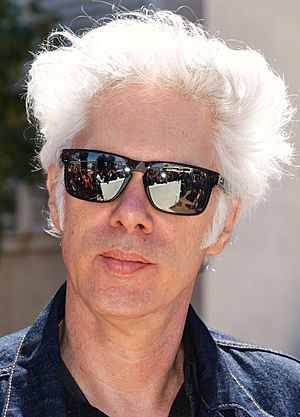
In the mid-1980s, Kurt Weill became an important influence on Waits's music. Weill's style of cabaret music influenced Waits's melodies and sounds. Waits also created the soundtrack for a documentary about homeless youth. His album Rain Dogs was recorded in 1985. Musically, Waits described it as a mix of "Appalachia and Nigeria." Keith Richards from The Rolling Stones played on several songs. Rain Dogs was highly praised by critics.
In September 1985, his son Casey was born. Waits then toured the U.S. and Europe. He also acted in Jim Jarmusch's film Down by Law, which featured songs from Rain Dogs. Waits and Jarmusch became good friends.
Waits also created a musical called Franks Wild Years, based on a song from Swordfishtrombones. He starred as Frank in the play, which was performed in Chicago. The songs from the show were released on his album Franks Wild Years in 1987. After this album, Waits toured North America and Europe. Two of these performances were filmed for the concert movie Big Time (1988).
Waits continued to work with other artists. He was a fan of The Pogues and appeared as a host for some of Elvis Costello's concerts. He also took small acting roles in films like Candy Mountain and Ironweed. In 1987, Waits and his family moved back to Los Angeles. He appeared in more films, including Cold Feet and Mystery Train.
In 1988, Waits sued a company for using a singer who sounded like him in a commercial. He won the case in 1992 and received a large amount of money. This made him and his wife known for protecting artists' rights.
New Projects and Later Work (1989–Present)
Theater, Film, and New Albums
In 1989, Waits started working with theater director Robert Wilson on a "cowboy opera" called The Black Rider. It was based on a German folk tale. Waits wrote the music, and William S. Burroughs wrote the lyrics. The Black Rider first opened in Hamburg, Germany, in 1990 and later toured internationally.
Waits continued to act in films. He played a puppeteer in Bearskin: An Urban Fairytale (1989) and a mobster's son in a play. Over the next four years, he appeared in seven films. He played a disabled war veteran in Terry Gilliam's The Fisher King (1991) and Renfield in Coppola's Bram Stoker's Dracula (1992). He also starred in Robert Altman's Short Cuts (1993).
In 1991, Waits and his family moved to Sonoma. Waits contributed songs to charity albums.

In August 1992, Waits released his tenth studio album, Bone Machine. He wanted to use "more machinery sounds" on the album. It was recorded in an old storage room. Eight of the songs were co-written with his wife, Kathleen Brennan. Critics called it a powerful and unique album. Bone Machine won a Grammy Award for Best Alternative Music Album.
Waits then recorded an album of the songs from The Black Rider, released in 1993. Waits and Wilson also worked together on a musical about Lewis Carroll and Alice Liddell, called Alice. Waits wrote songs for this play that he described as "adult songs for children." Alice premiered in Hamburg in 1992.
In early 1993, Waits's third child, Sullivan, was born. He decided to work less to spend more time with his children. He turned down offers to perform or act for three years. However, he made some guest appearances on other musicians' albums. In 1998, a collection of his songs from Island Records, Beautiful Maladies, was released.
New Record Label and Continued Success
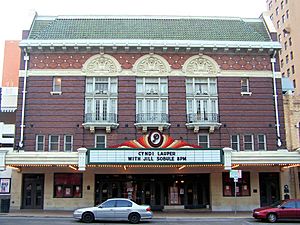
After his contract with Island Records ended, Waits signed with a smaller label called Anti-. He felt it was a "friendly place" that supported artists. In March 1999, Anti- released Mule Variations. Waits recorded the songs at Prairie Sun studio. The album explored themes of rural life in the U.S. Mule Variations reached number 30 on the U.S. Billboard 200 chart, his highest at that time. It was named "Album of the Year" by Mojo magazine and won a Grammy Award for Best Contemporary Folk Album.
In March 1999, Waits performed his first live show in three years at the South by Southwest festival in Austin, Texas. He also appeared on VH1 Storytellers. Later that year, he toured for Mule Variations. He also acted in the film Mystery Men as an inventor.
In 2000, Waits started writing songs for Wilson's play Woyzeck. He recorded the songs he wrote for both Alice and Woyzeck as separate albums. These two albums, Alice and Blood Money, were released at the same time in May 2002. Both albums reached high positions on the U.S. album charts.
In 2001, Waits received an award from the American Society of Composers, Authors and Publishers (ASCAP). He also joined a lawsuit against a music website for copyright issues. In 2003, he appeared in Jim Jarmusch's film Coffee and Cigarettes, having a conversation with Iggy Pop.
Recent Music and Film Work
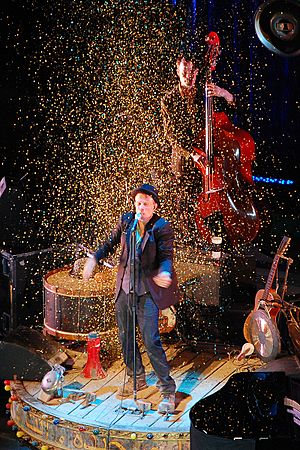
In 2004, Waits released his fifteenth studio album, Real Gone. He recorded it in an old schoolhouse. The album included his own beatboxing sounds. It also featured some political songs expressing his feelings about current events. Real Gone received positive reviews and reached the Top 30 in the U.S. and Top 10 in several European charts. He toured to promote the album, with many sold-out shows.
After a few years without film roles, he appeared in Domino (2005) and The Tiger and the Snow (2005). In 2006, Waits toured with his son Casey playing in the band. He also released Orphans: Brawlers, Bawlers & ..., a three-disc collection of rare and new songs.
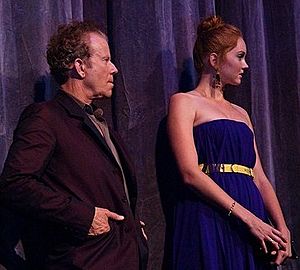
In 2008, Waits went on his Glitter and Doom Tour in the U.S. and Europe. Both of his sons played with him on this tour. In 2009, he released the live album Glitter and Doom Live. He continued acting, playing Mr. Nick in Terry Gilliam's The Imaginarium of Doctor Parnassus (2009) and an Engineer in The Book of Eli (2010).
Waits has also taken legal action against companies that used music similar to his in advertisements without his permission. He believes artists should not let companies use their songs in ads.
In 2010, Waits was reported to be working on a new musical with director Robert Wilson. In 2011, he released a collection of 23 poems called Seeds on Hard Ground to raise money for a food bank. On August 23, 2011, he announced his new album, Bad as Me, which was released later that year.
In March 2011, Tom Waits was inducted into the Rock and Roll Hall of Fame by Neil Young.
In 2012, Waits had a supporting role in the film Seven Psychopaths. In 2013, he lent his voice to an episode of The Simpsons. He also performed with the Rolling Stones on stage and at the annual Bridge School Benefit concert.
Waits made several appearances on the Late Show with David Letterman. In 2016, he was involved in a legal case with a French artist who used his songs in a theater performance. In 2018, Waits had a role in The Ballad of Buster Scruggs by the Coen brothers. He also provided narration for a play in London. In 2021, Waits had a supporting role in the film Licorice Pizza. In 2023, he joined Iggy Pop on a show where they shared stories and songs. In 2025, he appeared on an Italian TV show, reading from his poetry book and performing songs.
Tom Waits's Musical Style and Influences
Tom Waits has been influenced by many different artists and music styles. Early in his career, he was inspired by Bob Dylan's folk music and older composers like Irving Berlin. The word-jazz and poetry of writers like Jack Kerouac also influenced his 1970s albums.
After 1982, his music changed and drew from even more sources. These included the Rolling Stones, experimental composer Harry Partch, and Captain Beefheart's rock music. Literary influences also include writers like Nelson Algren. Waits says that for a songwriter, Dylan is "essential." He also praises Merle Haggard for songwriting.
Waits loves opera and recalls hearing Puccini's "Nessun dorma" and how it changed his life. He also admires jazz musician Thelonious Monk. One of Waits's own favorite ways to describe his singing voice is "Louis Armstrong and Ethel Merman meeting in Hell."
He is known for using many different and unusual instruments. On Swordfishtrombones, he used talking drums, bagpipes, and a glass harmonica. On Rain Dogs, he used an accordion and harmonium. On Bone Machine, he used a Chamberlin, and on The Black Rider, he used a singing saw.
Waits gives his wife, Kathleen Brennan, a lot of credit for inspiring him. He says she helped him combine his many different musical interests.
Tom Waits's Personal Life and Public Image
During the 1970s, Waits had relationships with comedian Elayne Boosler, Bette Midler, and Rickie Lee Jones.
In 1980, Waits married Kathleen Brennan. They live in Sonoma County, California, and have three children: Kellesimone (born 1983), Casey (born 1985), and Sullivan (born 1993). After he got married and had children, Waits became more private. Protecting his family's privacy became very important to him.
He often avoids questions about his personal life in interviews. He has also refused to allow anyone to write an official biography about him. Some people believe that Waits uses his public image as a way to keep his private life separate. He has been described as a "bard of the streets," creating a character for his fans.
Friends from his early career have said that Waits created a "funky dude" image, but that he was actually from a middle-class family. He has been described as a "contradictory character" – someone who can be gentle and kind but also strong if he feels someone is being unfair. He is also known for his sense of humor and enjoys telling jokes.
In his concerts, Waits often wears all black. He is a skilled performer who tells stories and uses props on stage. He believes a performance should be "a spectacle and entertaining."
Working with Other Artists
Over the years, Waits has worked with many artists he admires. He toured with saxophonist Teddy Edwards. Bruce Springsteen performed Waits's song "Jersey Girl" in concert. Waits and Kathleen Brennan wrote "Strange Weather" for singer Marianne Faithfull.
Keith Richards from The Rolling Stones played on several of Waits's albums, including Rain Dogs and Bad as Me. Richards has said that Waits's music is "so American" and a "weird mixture of stuff." Waits also wrote a poem for Richards's 80th birthday.
Waits has covered songs by other artists, like Kurt Weill and songs from Disney films. He sang on the song "Tommy the Cat" by the band Primus. He also added vocals to a re-release of Gavin Bryars's music. Waits has sung with Ramblin' Jack Elliott and produced albums for his friends Chuck E. Weiss and John P. Hammond. He has also appeared on albums by Los Lobos, Eels, and Sparklehorse.
Tom Waits's Albums
- Closing Time (1973)
- The Heart of Saturday Night (1974)
- Nighthawks at the Diner (1975)
- Small Change (1976)
- Foreign Affairs (1977)
- Blue Valentine (1978)
- Heartattack and Vine (1980)
- Swordfishtrombones (1983)
- Rain Dogs (1985)
- Franks Wild Years (1987)
- Bone Machine (1992)
- The Black Rider (1993)
- Mule Variations (1999)
- Alice (2002)
- Blood Money (2002)
- Real Gone (2004)
- Bad as Me (2011)
Tom Waits's Tours
- Closing Time Tour (1973)
- The Heart of Saturday Night Tour (1974–1975)
- Small Change Tour (1975–1976)
- Foreign Affairs Tour (1977)
- Blue Valentine Tour (1978–1979)
- Heartattack and Vine Tour (1980–1982)
- Rain Dogs Tour (1985)
- Big Time Tour (1987)
- Get Behind the Mule Tour (1999)
- Real Gone Tour (2004)
- The Orphans Tour (2006)
- Glitter and Doom Tour (2008)
Tom Waits's Film Appearances
Movies
| +Key | Denotes films that have not yet been released |
| Year | Film | Role | Notes |
|---|---|---|---|
| 1978 | Paradise Alley | Mumbles | |
| 1981 | Wolfen | Bar Owner | Uncredited |
| 1982 | One from the Heart | Trumpet player | Also composer (uncredited as actor) |
| 1983 | The Outsiders | Buck Merrill | |
| Rumble Fish | Benny | ||
| 1984 | The Stone Boy | Petrified man at carnival | Uncredited |
| The Cotton Club | Irving Stark | ||
| 1986 | Down by Law | Zach | |
| 1987 | Ironweed | Rudy | |
| 1988 | Greasy Lake | Narrator | Video |
| Candy Mountain | Al Silk | ||
| Big Time | Himself | Documentary; also co-writer | |
| 1989 | Bearskin: An Urban Fairytale | Silva | |
| Cold Feet | Kenny | ||
| Mystery Train | Radio D.J. (voice) | ||
| 1990 | The Two Jakes | Plainclothes Policeman | Uncredited |
| 1991 | At Play in the Fields of the Lord | Wolf | |
| The Fisher King | Disabled Veteran | Uncredited | |
| Queens Logic | Monte | ||
| Night on Earth | N/A | Composer | |
| 1992 | Bram Stoker's Dracula | R. M. Renfield | |
| 1993 | Short Cuts | Earl Piggot | |
| 1999 | Mystery Men | Doc Heller | |
| 2001 | The Last Castle | N/A | Composer with Jerry Goldsmith |
| 2003 | Coffee and Cigarettes | Himself | Segment: "Somewhere in California" |
| 2005 | Domino | Wanderer | |
| The Tiger and the Snow | Himself | ||
| 2006 | ...: A Love Story | Kneller | |
| 2009 | The Imaginarium of Doctor Parnassus | Mr. Nick | |
| 2010 | The Book of Eli | Engineer | |
| 2011 | The Monster of Nix | Virgil | Short film |
| Twixt | Narrator | ||
| 2012 | Seven Psychopaths | Zachariah | |
| 2018 | The Ballad of Buster Scruggs | Prospector | Segment: "All Gold Canyon" |
| The Old Man & the Gun | Waller | ||
| 2019 | The Dead Don't Die | Hermit Bob | |
| 2021 | Licorice Pizza | Rex Blau | |
| 2025 | Father, Mother, Sister, Brother |
Post-production | |
| 2026 | Wildwood |
Sterling Fox (voice) | In production |
| TBA | Wild Horse Nine |
Filming |
Television Shows
| +Key | Denotes films that have not yet been released |
| Year | Film | Role | Notes |
|---|---|---|---|
| 1991 | Fishing With John | Himself | Episode: 2 |
| 2013 | The Simpsons | Lloyd (voice) | Episode: "Homer Goes to Prep School" |
| 2021 | Ultra City Smiths | The Narrator (voice) | 6 episodes |
See also
 In Spanish: Tom Waits para niños
In Spanish: Tom Waits para niños
 | William Lucy |
 | Charles Hayes |
 | Cleveland Robinson |


